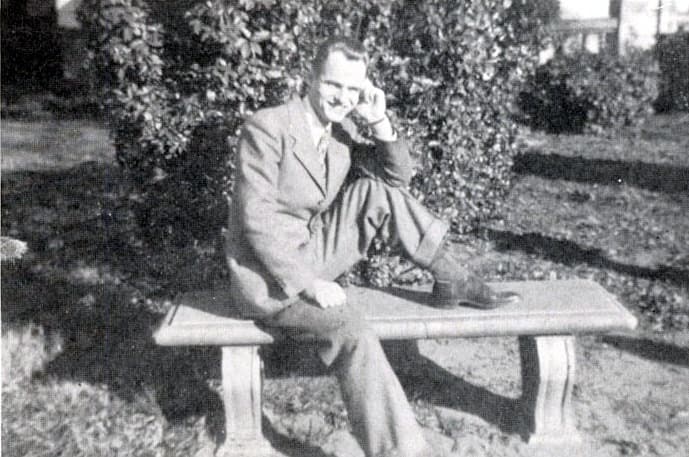If marriage is allowed to die, future generations likely will inherit a godless culture. We simply must have an answer in defense of biblical marriage that persuades the culture to protect and esteem the biblical design for human relationships, family structure, and social order—for the sake of the gospel in America.
—S. Michael Craven1—
From 1968 to 1990, Robertson McQuilken served as the third president of his alma mater, Columbia International University (CIU) in Columbia, South Carolina. During his tenure as president, the school was called Columbia Bible College, then Columbia Bible College and Seminary. Later, in 1994, it was renamed Columbia International University.

Robertson McQuilken, Columbia Bible College student
As president, McQuilken distinguished “himself as a spiritual and practical visionary.” Enrollment doubled, for example, and the school founded two radio stations. Moreover, McQuilken oversaw advancements in CIU’s accreditation status, expansion of its seminary and graduate programs, and enlargement of the school’s physical campus. It was a busy and fruitful 22 years.
 Ben Lippin campus in Asheville, North Carolina in the early 1970s
Ben Lippin campus in Asheville, North Carolina in the early 1970s
Previously, McQuilken had been headmaster of Ben Lippen School, which, although started by CIU, was then located in Ashville, North Carolina. After serving in this capacity, he and his family moved to Japan, where Robertson was a missionary and a church planter for 12 years. While there, he also led Japan Christian College as its interim president.2
Tough to Decide to Come; Easy to Decide to Leave
The decision to leave Japan to take the helm of Columbia International University, McQuilken has said, “was the most difficult I have had to make.”3 By contrast, 22 years later and eight years prior to retirement, the choice to step down was “painful” but “one of the easiest.”4
Robertson’s wife, Muriel, had Alzheimer’s disease. The symptoms had been evident for some time and had, over the years, increased in frequency and intensity. She now needed round-the-clock care, and Robertson knew what he had to do. While his circumstances allowed him to make the choice, that alone doesn’t explain why the decision was so easy. Truthfully, he felt he’d already made the decision 42 years earlier when, at his and Muriel’s wedding, he formally “promised to take care of Muriel ‘in sickness and in health…till death do us part.’”5 Hear this 2-minute excerpt from his resignation speech.
McQuilken relates some of his and Muriel’s experiences in a wonderful volume titled A Promise Kept: The Story of an Unforgettable Love.
While their story already had been made public by virtue of his position at CIU, Robertson hesitated to give it a wider audience for a variety of legitimate reasons. He feared
that some might get the impression that I’m advocating my approach to caring for a loved one as the only right approach. And that misrepresentation could easily bring condemnation or guilt for the many who cannot, because of various circumstances, do as I have done. I hope none will hear me advocating my approach as the only or best approach in all circumstances. I’m just telling my story, celebrating the joys of married love, not pushing a specific agenda for caregiving.6
Despite his reservations, Robertson saw the potential for good that could come from sharing what was happening in his and Muriel’s relationship. Robertson took care of Muriel for 13 years, until she died at 81 on September 20, 2003. He declared, “I don’t see how I could have any more grief.”
I don’t see how I could have any more grief.
—Robertson McQuilken, referring to the death of his wife, Muriel, from Alzheimer’s disease—
Yet his life was not over. Robertson would live 13 years beyond Muriel’s passing. He was in his seventies and eighties but even was able to return, to some extent, to a public ministry. In 2005 he remarried. Deborah Jones, a professor at the University of South Carolina School of Nursing, became his second wife. Robertson McQuilken lived to be 88 years of age and passed away on June 2, 2016.
Supernatural Help to Reflect a Supernatural Love
I, too, have some reservations about relating this account of married love. I fear it may come across as “too perfect” for today’s world and the relationships that prevail in it. I am a realist. I understand that all marriages have their ups and downs, their challenges, and their seemingly insurmountable problems.
Yet I also am a realist with regard to the truth of God’s existence and the supernatural resources available to Christ’s followers. Christians have spiritual assets the world does not have. We have “the mind of Christ” and the Holy Spirit, who produces supernatural fruit in our lives. “He who abides in Me, and I in him,” Jesus said, “bears much fruit; for without Me you can do nothing.” As one Bible scholar notes, “The permanent relationship God wants every believer to have can best be described as ‘full’ —fully yielded to the Spirit’s control, giving evidence in a life and ministry charged with His own power, and an inner sense of joy in His presence.”7 That scholar is none other than Robertson McQuilken himself!
There’s something else we as believers have, as well. We have the relationship of Christ and His church as a model of what marriage is supposed to look like. Because the bond between Christ and His church is all about the gospel, marriage is to reflect the gospel—the best news ever announced.
The image at the top provides a clear illustration. Just as Mirror Lake reflects Oregon’s Mt. Hood on the surface of its waters, Christian marriage gives people a glimpse of Christ’s relationship to the church and the gospel. People who are unfamiliar with Christ’s sacrifice for His church surely can at least begin to understand it when they see demonstrations of sacrificial love in Christian marriages.
People who are unfamiliar with Christ’s sacrifice for His church can at least begin to understand it when they see demonstrations of sacrificial love in Christian marriages.
Yes, earthly examples are blurred and unclear when contrasted to the genuine article of Christ’s sacrifice. We understand this. Yet they still can be clear enough to offer people a glimpse of the gospel. Mark it down. The gospel is both offensive and attractive—offensive because it reveals the truth about the human condition, yet attractive because it points people to the only solution to humanity’s most basic problem. People often are put off by the gospel’s message initially, but when they see it demonstrated, cracks form in the walls of resistance they’ve erected.
No one wants hardship, of course; but don’t we want to be in a strong, healthy relationship that is able to deal with and withstand hardships of all sorts? When we think of it in these terms and ask, “Who would not want to be a part of a love story that is on par with the McQuilkens’?” we know the answer, don’t we? No one.
Why a Same-Sex Relationship Can’t Be a Marriage
But wait! someone may say. Can’t a same-sex relationship “withstand hardships of all sorts”? Especially against the backdrop of the McQuilkens’ story, the answer is both yes and no. Certainly we see strong bonds in various non-sexualized male friendships and female friendships. Moreover, gays and lesbians can indeed care deeply for their partners emotionally, provide care for them physically, and work with them to overcome and endure a wide range of challenging circumstances. Commitment is not unique to heterosexual relationships alone, and we readily acknowledge this.
We’re kidding ourselves, however, if we think two men or two women in a same-sex “marriage” can have the same kind of relational dynamic in their union the McQuilikens had in theirs, or that any other married heterosexual couple have in theirs. Let’s put it another way. No same-sex union ever can produce a love story on par with those of heterosexual couples.
Here’s why. Men and women are different, and it is these differences that set the stage for relational complementarity in a heterosexual union. While these same differences give the couple challenges that same-sex couples don’t have, they also give the couple benefits that two men or two women never can know. Moreover, with a man and woman, contrasting masculine and feminine traits give rise to a relational mystery that serves to cement the couple’s union, especially when they learn to explore this mystery together. This process bonds them in ways not possible for two people of the same sex.
There’s more! Procreation can occur only in a heterosexual relationship. Same-sex parents can—and do—love and care for their adopted children. Even so, only a man and a woman can come together in life-creating sexual activity, and this profoundly strengthens their relationship on many levels! This bonding benefits not only the couple, but the children born to them as well. In crystal clear ways, nature teaches that a wife makes it possible for her husband to become a father, and a husband makes it possible for his wife to become a mother. Mark it down! Nothing like this ever happens, or can happen, between two men or two women.
Only a man and a woman can come together in life-creating sexual activity, and this profoundly strengthens their relationship on many levels!
For these reasons and many more, only a heterosexual union can be a marriage. We state this not with animosity, hostility, or hatred, but simply in recognition of the truth. If something never can be a marriage, calling it a marriage won’t make it one—ever!
The Responsibility to Point the Way Back
Alarmingly, society is losing its grip on what marriage is, and what it is supposed to be. In a BreakPoint commentary dated March 31, 2017 and titled “The Silent Suffering of Gay Men,” John Stonestreet astutely observed,
Over a year and-a-half after the [Supreme Court] Obergefell decision [that redefined marriage in the United States], the debate over gay “marriage” and homosexuality has largely fizzled out: partly because of the election, partly because the “T” in the LGBT acronym has been stealing all the headlines, and partly because Obergefell is now viewed by many as settled law. And that’s a shame, because so-called “progress” isn’t bringing about the rosy picture we were promised.
The debate over gay “marriage” and homosexuality has largely fizzled out—and that’s a shame, because so-called “progress” isn’t bringing about the rosy picture we were promised.
—John Stonestreet—
The church must reignite this debate, for the sake of homosexuals who suffer silently as well as for society as a whole. God’s people are in a unique and strategic position to help the culture get out of the mess that has resulted from redefining marriage—and I don’t just mean redefining marriage through Obergefell. The truth is that the meaning of marriage has been under assault for decades!
To begin with, the church must teach the next generation of Christians how and why God’s Word is right about marriage. This includes explaining how and why God’s design for marriage represents gospel.
Thankfully, God has used the McQuilkens’ story to encourage husbands and wives in their marriages. It is my prayer that through this post, He also will use it to remind believers everywhere that natural marriage—one man and one woman committed to each other for life—is, and is to be, a picture of the gospel.
What the Church Must Do
Here is the beginning of a 12-item list of qualities that must characterize the church’s case for natural marriage. We’ll examine two items now, and next time the remaining ten.
First, believers must contend for marriage with greater sincerity. All too often Christians and the church have ignored the marriage issue as too controversial. It will turn people away. People will misunderstand. Yet marriage really is about the Christ and the church, and upholding the ideal of marriage can indeed help people begin to see and understand God’s good news. We need to really believe this! As evangelical leader Martyn Lloyd-Jones observed, “When the church is absolutely different from the world, she invariably attracts it. It is then that the world is made to listen to her message, though it may hate it at first.”
Second, we must uphold marriage with greater authenticity. We need to work on our own marriages and, with God’s help, bring them to a clearer representation of Christ’s relationship with His church. Marriages like the McQuilkens’ can inspire us to do this. On a regular basis, Focus on the Family offers encouragement and appropriate challenges toward this end. Tune in to the broadcast and visit this excellent ministry online. Family Life is another such ministry. Even more directly, churches must step up to the plate to teach and equip men and women to be better husbands and wives—and to teach young people to become men and women of God who will be better husbands and wives when they’re married.
Remember, however, that as important as good marriages are, this isn’t just about having good marriages, but about upholding marriage.
We’re just getting started on our 12-item list. We have ten more items to discuss.
We’ll tackle them next time. See you then!
An abbreviated version of this article is available here.
View summaries of all the articles in this series here.
Copyright © 2017 by B. Nathaniel Sullivan. All rights reserved.
Notes:
1S. Michael Craven, Uncompromised Faith: Overcoming Our Culturalized Christianity, (Colorado Springs, CO: NavPress, 2009), 151.
2Robertson’s McQuilken’s work and ministry through the years is summarized beautifully in this this CIU video.
3,4Robertson McQuilken, A Promise Kept: The Story of an Unforgettable Love, (Carol Stream, IL: 2006), 21.
5Ibid., 22.
6Ibid., Acknowledgements page.
7Robertson McQuilken, Life in the Spirit, (Nashville: Broadman & Holman Publishers, 2000), 164.

